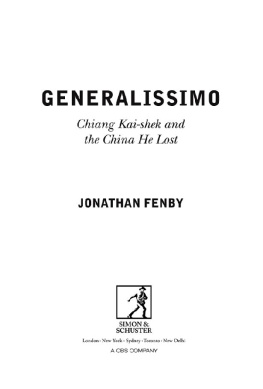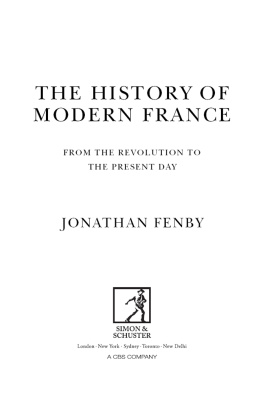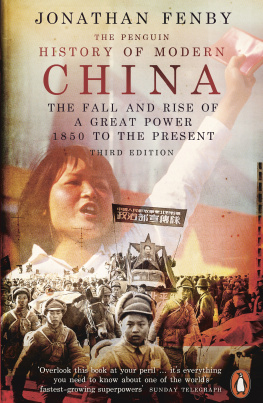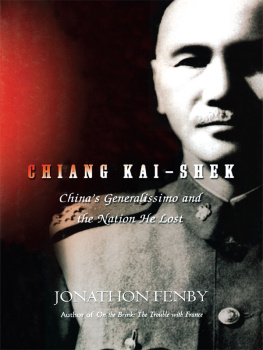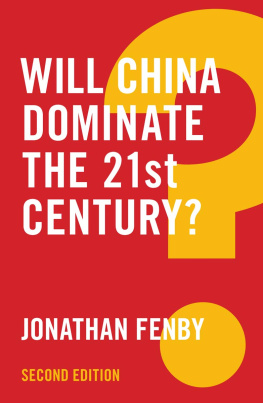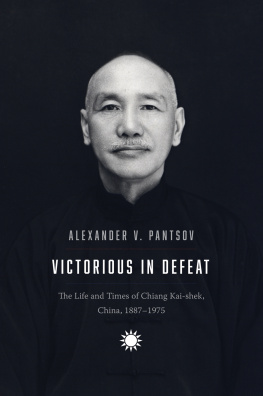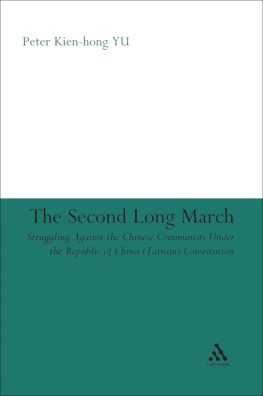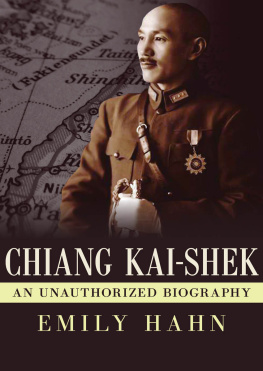Jonathan Fenby is a former editor of the Observer in London and of the South China Morning Post in Hong Kong, which he steered through the handover of the colony from Britain to China in 1997. He has also worked for The Economist, the Guardian, the Independent and Reuters. His previous books include the acclaimed On the Brink: The Trouble With France and Dealing With the Dragon: A Year in the New Hong Kong.
Further praise for Generalissimo:
Fenby has a gripping story, and tells it with great verve and insight... Fenby has dug up new dirt on the Generalissimo Murray Sayle, Spectator
One of the merits of Jonathan Fenbys book is its fair-mindedness. Fenby does not gloss over the corruption that poisoned Chiangs regime... Nor is Fenby squeamish about describing the brutality of Chiangs campaigns to get China under his thumb. He is rather good on the gory and grotesque details... Fenby lays to rest the canard that Mao did all the fighting against Japan, while Chiang treacherously stood by. In fact, the reverse is nearer the truth... The savagery of the civil war, as well as the rest of this tragic story, is well described Ian Buruma, Sunday Telegraph
[Fenby] has evolved a technique that might be dubbed forensic colour, using books and newspapers of the time to re-create the glitter and grime of the China that Chiang lost. His cast of characters is rich Michael Sheridan, Sunday Times
The first full-scale biography in English for a generation, Fenbys book does an excellent job of laying out what was good about Chiang, taking account of the appalling context in which he operated... And delightfully much is made of the eccentricities of Chiang [and] his seductive and imperious wife, Meiling Christopher Lockwood, Daily Telegraph
[An] important new biography, the first of substance for a quarter of a century John Gittings, London Review of Books
Jonathan Fenbys spirited Generalissimo... offers a fresh look at the Chungking regime with revisionist interpretations of the 192749 Nationalist decades... Fenby gives a vivid account of the mess and heroism of [the Northern Expedition]... [making] good use of scholarly literature Robert Bickers, TLS
Jonathan Fenby understands why Chiang Kai-Sheks western boots lost China to Maos peasants feet Xinran
A wonderful achievement Eastern Economic Review
Eminently readable... an excellent introduction to the study of the Chinese Republican period Kenneth C. Walker, Asian Affairs
Also by Jonathan Fenby
THE PENGUIN HISTORY OF MODERN CHINA: THE FALL AND RISE OF A GREAT POWER
DRAGON THRONE: THE IMPERIAL DYNASTIES OF CHINA
THE SEVENTY WONDERS OF CHINA (ED.) ALLIANCE: THE INSIDE STORY OF HOW ROOSEVELT, STALIN AND CHURCHILL WON ONE WAR AND BEGAN ANOTHER
THE SINKING OF THE LANCASTRIA: BRITAINS WORST NAVAL DISASTER AND CHURCHILLS COVER-UP
GENERALISSIMO: CHIANG KAI-SHEK AND THE CHINA HE LOST
DEALING WITH THE DRAGON: A YEAR IN THE NEW HONG KONG
ON THE BRINK: THE TROUBLE WITH FRANCE
THE GENERAL: CHARLES DE GAULLE AND THE FRANCE HE SAVED
TIGER HEAD, SNAKE TAILS: CHINA TODAY, HOW IT GOT THERE AND WHY IT HAS TO CHANGE
First published in Great Britain by Simon & Schuster UK Ltd, 2003
This ebook edition published by Simon & Schuster UK Ltd, 2015
A CBS company
Copyright 2003 by Jonathan Fenby
This book is copyright under the Berne Convention.
No reproduction without permission.
All rights reserved.
The right of Jonathan Fenby to be identified as the author of this work has been asserted in accordance with sections 77 and 78 of the Copyright, Designs and Patents Act, 1988.
Simon & Schuster UK Ltd
1st Floor
222 Grays Inn Road
London WC1X 8HB
www.simonandschuster.co.uk
Simon & Schuster Australia, Sydney
Simon & Schuster India, New Delhi
A CIP catalogue record for this book is available from the British Library
ebook ISBN: 978-1-47114-295-6
The author and publishers have made all reasonable efforts to contact copyright-holders for permission, and apologise for any omissions or errors in the form of credits given. Corrections may be made to future printings.
Typeset in the UK by M Rules
To Sara and Alexander,
with love
CONTENTS




ACKNOWLEDGEMENTS
This is the first full biography of Chiang Kai-shek for almost three decades. It would not have been possible without drawing on extensive research into the period up to 1949 by scholars in mainland China and Taiwan, Hong Kong, the United States, Britain, Australia, France and elsewhere. I am grateful to all those whose work is referred to in the text or appears in the source notes. I also benefited from conversations with Lu Fan-Shang, Chen Yung-Fa and Yu Mii-ling of the Academia Sinica, Professor Jiang Yung-chiang, and officials at the Government Information Office and Kuomintang Party headquarters in Taipei where K. Y. Kuo was extremely helpful, both in arranging meetings and in providing his four-hour video recordings of the Young Marshal. Also in Taiwan, Jason Blatt gave ever-cheerful help; Windsor Chen indicated contacts; and Parris Chang spurred ideas on Chiangs last year on the mainland. I am indebted to the librarians at the Academia Sinica, Taipei Times and the China Post. Since this book may not be to the taste of some in Taiwan, I would like to stress that the responsibility for what I have written is mine alone. In Hong Kong and mainland China, I am particularly grateful to Willy Lo Lap-Lam, Mark ONeill, Jasper and Antoaneta Becker, John Gittings and Matthew Miller, to Michelle Wan in Shanghai, and for the assistance of guides on visits to key places in Chiangs life.
I owe a particular debt to two people who read the manuscript in its final stages; Keith Stevens has been a constant fund of useful suggestions and provided great linguistic help while Rana Mitter was a steady source of support and assistance, in particular in coming up with significant comments that improved the manuscript in its final stage. In Cambridge, Hans van de Ven was kind enough to let me see the manuscript of his book on the Chinese Army as well as providing advice on various points. In Oxford, I had illuminating conversations with Stephen Tsang at St Anthonys and with Graham Hutchings, who also provided the lead to photographs from the Nanking archive. I also benefited from the help of Frank Diktter and Gary Tiedemann at the School of Oriental and African Studies, and of conversations with Shu Yun, Eddie U, Ann and Don Morrison, and Jean-Philippe Bja. The late Doon Campbell was good enough to provide papers from his time as Reuters correspondent in Chungking.
The library of the SOAS in London was an invaluable resource, and I would like to thank the staff for their help, in particular the Chinese librarian, Mrs Small. As well as academic works, SOAS proved to be a trove of books and diaries by contemporary visitors to China, many of which do not appear to have been used before, and for the files of the

